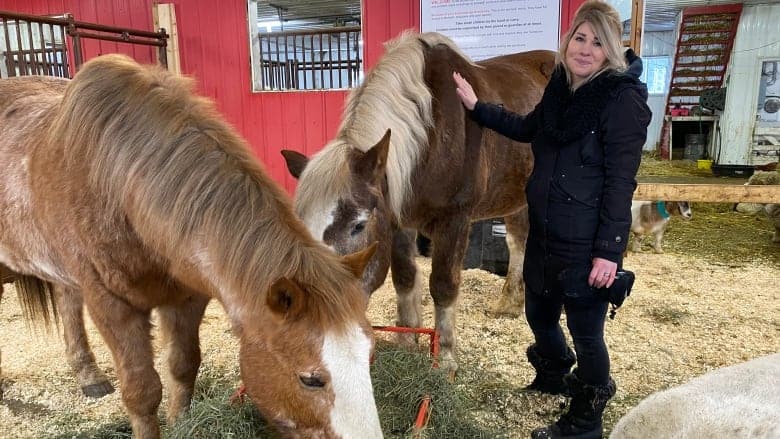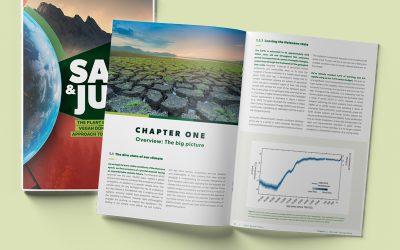Blog
The Live Export of Horses And Their Slaughter Must End
November 1, 2023
Horses are magnificent gentle creatures. These highly intelligent animals are also very social and use their senses to recognize other horses they have become friends with. Horses form strong social relationships with each other and usually live in herds. They would rarely isolate themselves from other horses by choice, such as being locked in a stable alone or in transport. In fact, it’s been proven in several studies published in PLOS One that prolonged social isolation of horses may cause them to have several health conditions as well as behavioural problems, stress, depression, and even a weakened immune system. Keep reading to learn what is currently happening to horses in Canada and overseas and what you can do to take a stand against it.

Danae Tonge (Manitoba Animal Save) with two rescued horses. Tonge has witnessed and recorded many shipments of live horses from Winnipeg’s airport to Japan. (Photo credit: Karen Pauls/CBC News)
Horses are unloaded from semi trucks at Winnipeg airport, on their way to Japan. (Video credit: CBC News)
Canada Breeds Horses For Human Consumption
Not only does Canada breed horses for human consumption, but the country plays a huge role in the horsemeat market. The Government of Canada website states, “Horse meat is eaten in Canada and various countries in Europe, Asia and South America. Horse meat is exported to Japan and other countries from facilities that are licensed by the Canadian Food Inspection Agency (CFIA).”
The United States banned horse meat for human consumption in 2007, and they are no longer transporting live horses to be killed, so why won’t Canada do the same?
“On January 27, 2007, simultaneous bills were introduced in the Senate and the House [of Commons] to prohibit the slaughter of horses for human consumption and to ban the transport of live horses from the United States to countries where they could be slaughtered for human consumption.”
– National Library of Medicine
Horses bred in Canada are flown to Japan to be fattened up before being slaughtered for food. Many people are outraged when they find this out (as they should be), but horses are not the only animals being fattened up before being violently killed. The foie gras industry force-feeds ducks and geese enormous amounts of food in the cruelest of ways until their liver gets to massive unnatural sizes and then kills them. (Read more about foie gras here).

Photo credit: Canadian Horse Defence Coalition
Society often regards horses differently than other animals deemed “livestock” by the animal agriculture industry, like cows, pigs, and chickens. Horses are commonly seen as companion animals like dogs or cats and are not often considered a “food item” in North America. But protecting horses is a crucial first step towards the rights of all animals being transported and sent to slaughter since all animals deserve to live in peace and freedom.
Before even arriving for their harrowing flights to their ultimate death, horses have been found in manure-infested feedlots where they are not cared for properly. Horses have “cracked hooves and injuries, and some are clearly diseased.”
If you are already familiar with what goes on behind the closed doors of slaughterhouses, you likely know there is no such thing as “humane euthanasia”; a term often used for horses right before they are brutally killed.
“In December 2011, The Canadian Horse Defence Coalition (CHDC) released a fourth investigative report, “Pasture to Plate” documenting inhumane horse slaughter at Les Viandes de la Petite-Nations in Quebec. This investigation provides compelling evidence that the much touted Equine Identification Document (EID) program put forward by the Canadian Food Inspection Agency (CFIA) invites fraud.”
Live Horses Are Shipped Overseas For Slaughter
Every year thousands of live horses are exported from Manitoba and Alberta and killed for their meat. Their trips overseas have been known to take over 24 hours, during which the horses have no food, water, or resting places. They are held in tiny unnatural crates for their entire trip in dangerous and stressful conditions.
In 2021, videos circulated online posted by The Winnipeg Humane Society about horses in crates on the Winnipeg airport tarmac. Then in 2022, animal welfare advocates “filed a legal complaint with the federal government after a December 2022 shipment of live horses to Japan exceeded the legal 28-hour limit without food, water or rest.” The scared horses were being loaded on a Korean Air cargo plane.

Earlier this year, CBC News Manitoba published an article explaining how Canada isn’t doing enough to protect horses flown to Japan and spoke with Danae Tonge from Manitoba Animal Save.
“Outside the metal airport security fence, Danae Tonge of Manitoba Animal Save was one of the people photographing and videotaping the 79 horses being unloaded from semi trucks. She said they were put three or four deep into wooden crates and left on the tarmac for hours until they were re-loaded onto the plane.”
Horses are easily panicked, become stressed and agitated by loud noises and have strong flight instincts. The horses from the December flight were stuck in transit for over 30 hours, violating Manitoba’s Animal Care Act and federal Health of Animals Regulations.
“By the time it reached Seattle, Tonge said the horses had already been in transit an estimated 16.5 hours. They had to wait 3.25 hours before the flight took off. It was another 11.5 hours to Kagoshima, Japan, for a minimum 32.5 hours without food, water or rest. It’s not known how long it took to get to the Winnipeg airport or transport the horses from the airport in Japan to a quarantine site.” – CBC News Manitoba
Speak Up And Get Involved To Protect Horses
Horse rescue groups are working hard to save horses in Canada from auction houses before they get sent to slaughter or are shipped overseas for long agonizing journeys. The Canadian Horse Defence Coalition (CHDC) is trying to ban the slaughter of horses for human consumption in Canada and other countries. Their website details (with photos) how horses are crammed together and shipped live in small wooden crates, and sometimes the heads of taller horses hit the roof of the crates. Some horses are packed so tightly that they are unable to stand naturally.

“Numerous horses have died during landing accidents or “due to a combination of a substantial delay, the large size of the horses, and significant stress levels in the animals.” One horse, on a flight out of Calgary, was discovered dead and upside down in a crate.” – People For The Ethical Treatment of Animals
The CHDC launched a lawsuit in response to the breaches of legislation against the live shipment of horses. This is a step (and a hoof) in the right direction, but there is much to be done because horses are still being shipped and killed.
Canadian singer-songwriter Jann Arden, a Plant Based Treaty endorser is taking a stand and advocating to end the live export of horses from Canada to foreign countries to be slaughtered, and is working with CHDC to spread this important message. Their campaign asks citizens and government officials to review the legislation that still permits live horses to be shipped overseas to slaughter. On June 30th, 2023, Jann Arden met with Prime Minister Justin Trudeau to discuss the issue of live horse transport and the legal loophole that permits it to still happen. Find out how you can get involved in their campaigns and speak up for horses at Horseshit.ca
Other ways to help stop horses being slaughtered is to sign Plant Based Treaty petition. In demand 1 of the Plant Based Treaty, point 9 the Plant Based Treaty calls for a ban on all live exports.
Let’s work together and help horses lead the way for the better treatment of all animals being killed for food.

Miriam Porter is an award-winning writer who writes about veganism, social justice issues, and eco-travel. Miriam currently lives in Toronto with her son Noah and many rescued furry friends. She is a passionate animal rights activist and speaks up for those whose voices cannot be heard.
More from the blog
6 Important Calls To Action From The Safe And Just Report – Part One
By Miriam Porter
Grow Your Own Kale And Spinach For Healthy Green Smoothies
By Miriam Porter
The Importance Of Exercise And Tips On Building Muscle
By Miriam Porter



